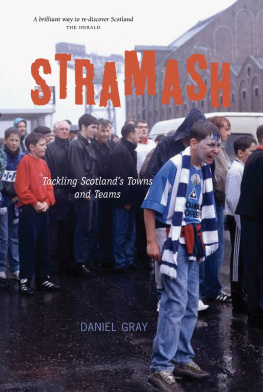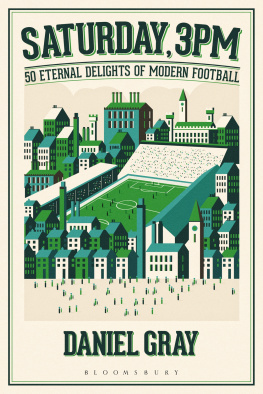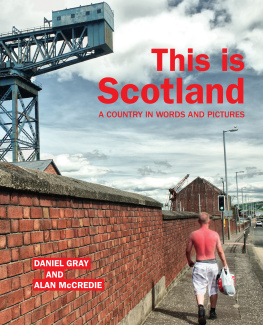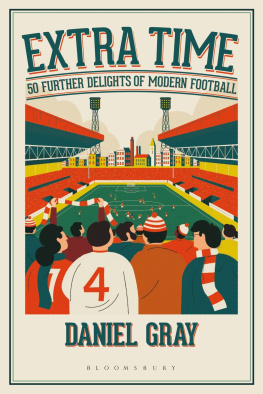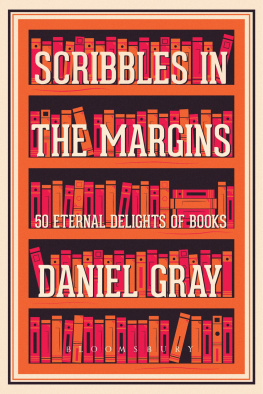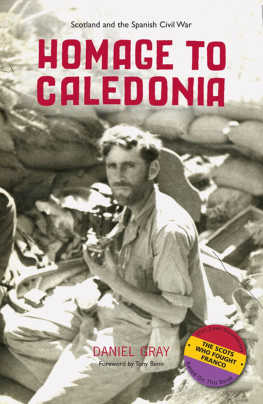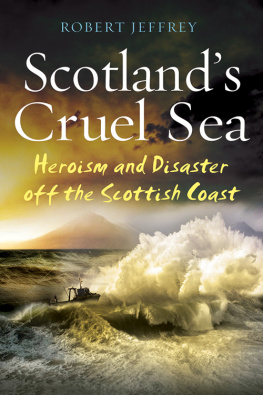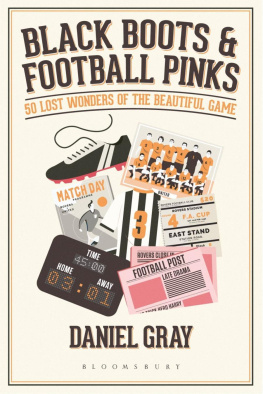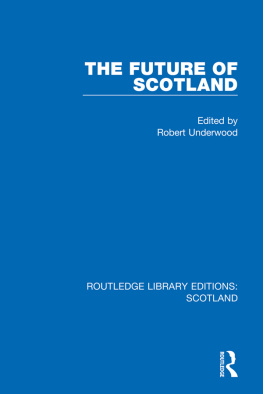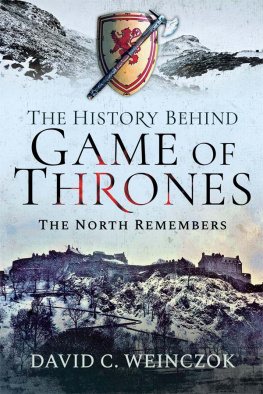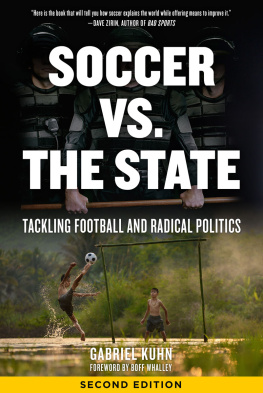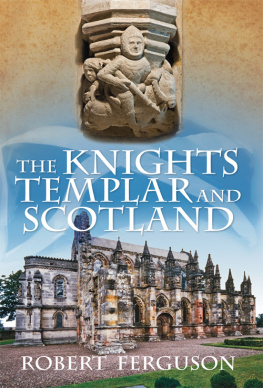DANIEL GRAY is the author of the Saltire Award-nominated Homage to Caledonia: Scotland and the Spanish Civil War . Since its publication, the book has been turned into a television series and Edinburgh Fringe show. Daniels previous book, co-authored with David Walker, was the Historical Dictionary of Marxism, for which they have still to sell the film rights. He has regurgitated the same jokes in the fanzine of his beloved Middlesbrough FC, Fly Me to the Moon, for the worst part of a decade. Daniel also reviews books for, among others, History Scotland, writes a column in The Leither magazine and has worked as a manuscripts curator and television researcher. He lives in Leith with his wife Marisa.
An excellent book about the countrys smaller teams [Stramash] captures the vague romance that still clings to these smaller Scottish clubs. It will make a must-read for every non-Old Firm football fan and for many Rangers and Celtic supporters too.
DAILY RECORD
There have been previous attempts by authors to explore the off-the-beaten paths of the Scottish football landscape, but Daniel Grays volume is in another league.
THE SCOTSMAN
As he takes in a match at each stopping-off point, Gray presents little portraits of small Scottish towns, relating histories of declining industry, radical politics and the connection between a team and its community. Its a brilliant way to rediscover Scotland.
THE HERALD
A great read, because Gray doesnt write about just football, he uses football as an excuse to explore the histories of small towns in Scotland.
THE SKINNY
Why do the Gers and Hoops have retail outlets in the capital? Why do buses depart for Glasgow on a Saturday morning from every corner of Scotland? Grays book is a splendid attempt to answer these questions, and more besides The result is sociology at its best, which is to say eminently readable Stramash may turn out to be a memoir of the way we were, and an epitaph.
SUNDAY HERALD
I defy anyone to read Stramash and not fall in love with Scottish footballs blessed eccentricities all over again Funny enough to bring on involuntary, laugh out loud moments.
THE SCOTTISH FOOTBALL BLOG
Stramash
Tackling Scotlands Towns and Teams
DANIEL GRAY

Luath Press Limited
EDINBURGH
www.luath.co.uk
First published 2010
Reprinted 2011
Reprinted 2012
eBook 2012
ISBN (eBook): 978-1-909912-28-1
Map John McNaught
The authors right to be identified as author of this book under the Copyright, Designs and Patents Act 1988 has been asserted.
Daniel Gray 2010
Table of Contents
To those that push the turnstiles in search
of a more splendid life.

WHAT WOULD SATURDAY be without the match? It is a glorious opportunity to blow off steam that has been gathering for a week. Oucha dirty! Pitimaff! Dig a hole, Ref! And all the other choice expressions heard where the big ball is being banged.
Then a new world the next week. The man you dubbed a puddin is now the cats whiskers. His antics tickle you no end. Give him the works thats the stuff! shoot! Goa... hard lines, ower the baur.
What an atmosphere. Every move charged with electricity. Some of the players charged with dynamite, at least thats what it seems like to the poor fellow who gathers himself up from a sea of mud and politely asks the referee: is this Sauchiehall Street or Tuesday?
But its all in the game. The blokes in the work talk about it for weeks to come. You havent the slightest idea. I know a couple of the lads in one of the Clyde Shipyards who got into an argument one day. They were so engrossed, and at times so heated, that it was only when the watchman tapped them on the shoulders and asked them why they werent away for the Fair Holidays like everybody else they discovered they had been at it for the whole weekend.
Yes, thats FOOTBALL!
Alloa Football Club: Official Handbook and Fixtures, 1947/48
Acknowledgements
I AM INDEBTED to the work of local and football club historians down the years. Without them, much social and footballing history would have been lost, and my hope is that readers of Stramash will support their work in future. Interviewees Bernie Slaven, Dick Clark, Duncan Carmichael, Ian Rankin, Jake Arnott, Jim Banks, John Wright, Karen Fleming, Robin Marwick and Vincent Gillen were helpful and fascinating, each in their own way as befits the diversity of their subjects and roles. John Simpson (Alloa), John Litster (Raith Rovers), Forbes Inglis (Montrose), Crawford (Clyde) and Giancarlo Rinaldi (Queen of the South) gave valuable advice on their own clubs chapters.
Michael Reilly of the Coatbridge Irish Genealogy Project was extremely supportive too. The vast majority of images in this book were provided by Mark IAnson, artist supreme and a keeper of this nations football heritage. Aside from that, Marks advice and anecdotes were treasured, his insistence on feeding me broccoli less so. At Luath Press, enormous thanks must go to Gavin MacDougall for having faith in me again, my editor Leila Cruickshank for her patience and meticulousness, and Tom Bee for the cover. That cover features one of my all-time favourite pictures of anything, never mind football; I am grateful to Stuart Clarke. On a personal level, thanks to The Gaffer for forcing me into a second trip to Greenock, Paddy Dillon (www.thenetherregions.co.uk) for reminding me football could be funny (who do you werk for?) and Robert Nichols at Fly Me To the Moon for first publishing my piffle nearly a decade ago. My mums encouragement is as strong as ever, and hopefully a book about football makes sacrifices such as driving me to Chesterfield for a League Cup tie to test out your new car (my words) worthwhile. This football gubbins really started with my dad at Ayresome Park in 1988; a million Midget Gems later and hes still this Dannys champion. Marisas love and support continues to be boundless and inspiring; one day Ill get a real job so you can finally write your A History of the Babbity People.
www.stramashthebook.com
twitter.com/stramashthebook
Introduction
WHEN I MOVED TO Scotland from north-east England in 2004, I was amazed by how few people supported their local football teams. This was not the case in small towns alone, but in Edinburgh too. There, Rangers and Celtic tops were ubiquitous, and both clubs had retail outlets in the city.
I hadnt even watched them play and already I was sick of the Old Firm. Their domination was similar to that of the chain supermarkets and cafs which had made visiting different high streets the equivalent of having a girl in every port who looked and sounded exactly the same. What had happened to those curious names of my youth like Partick Thistle and Queen of the South? These were team names, town names and names that didnt appear on a map which had taken on an air of wonder and exoticism when I was growing up. There had been an otherness about those farthest reaches of the results on Sports Report as they were whispered from my dads car radio. When labelling these places pools coupon towns, writer Jonathan Meades defined what so many of us in England felt.
Scottish football was a mystery to me in my youth, and little changed in my first five years here. I didnt help my own cause by failing to engage with it. At least twice a month, Id make my way to Teesside to watch Middlesbrough, and that by choice. On spare Saturdays, Id catch up with real life when really I shouldve adopted a second team here.

